Watch: Virtual Launch of Uganda’s Efficient Productive Use of Energy Chapter
Uganda’s Efficient Productive Use of Energy Chapter was recently launched in a virtual event.

Uganda’s Efficient Productive Use of Energy Chapter was recently launched in a virtual event.


Today, as part of the US government’s Power Africa initiative, USAID launched a Women’s Local Chapter on Efficient Productive Use of Electricity (EPUE) in Uganda that brings together women entrepreneurs who rely on energy for production and advises them to leverage clean energy for producing, processing, and adding value to goods and services. The Chapter will serve as a networking, capacity building, and information repository for members using EPUE technologies.
During the launch, USAID announced the provision of microgrants to seven women-owned businesses in Uganda to help them upgrade their equipment to energy-efficient models that increase their productivity. The microgrants will cover 50 percent of the cost of purchasing modern equipment like sewing machines, institutional electric ovens, ice cream machines, tailoring and embroidery machines, electric cookers, microwaves, juice extraction machines, deep freezers, and refrigerators. USAID awarded the grants under its Energy Empowers East Africa (EEEA) activity, led by the Lawrence Berkeley National Laboratory (Berkeley Lab) and implemented by the Clean Energy Enthusiasts. This activity promotes energy efficiency, access, and inclusion for women-led projects in Uganda. Stephane de la Rue du Can, research scientist at Berkeley Lab, said, “The grants demonstrate USAID’s commitment to the economic empowerment of women by increasing the women’s capacity to benefit from electricity by using EPUE equipment.”
Suriana Kekimuri, program participant, a widow based in Kamwenge District, said that the freezer she received consumes less electricity and therefore saves her money. “It will increase my sales from fresh juice and porridge by more than 300 percent. I will be able to take care of my (two) children from this income.”
The Women’s Local Chapter on EPUE was formalized through the signing of a Memorandum of Understanding between Clean Energy Enthusiasts, which is Energy Empowers East Africa program’s local implementer, and Uganda Women in Trade and Manufacturing, a local women’s trade organization. Through this chapter, Clean Energy Enthusiasts will raise awareness and train many of the association’s 2,300 members to access energy and deploy new technologies in their businesses.
For more information, please contact: Cindy Nkwanzi (cindy@energyenthusiasts.co.ug).
Energy Empowers East Africa (EEEA) is a USAID-funded project focusing on increasing the EPUE among women-led and women-owned businesses in Uganda. EEEA is implemented by Berkeley Lab with support from Clean Energy Enthusiasts, as the Ugandan implementer.
The Lawrence Berkeley National Laboratory (Berkeley Lab) is a U.S. Department of Energy (DOE) Office of Science national laboratory managed by the University of California. The EEEA project is part of the Energy Efficiency for Development (EE4D) initiative that provides technical resources and expertise to support USAID partner countries in advancing energy efficiency strategies and achieving more resilient and sustainable economic development. Based on a solid partnership between USAID and Berkeley Lab, EE4D helps with policy, planning, and deployment support for energy-efficient development and smart technologies uptake across the world.
Clean Energy Enthusiasts (CEE) is a Ugandan energy advisory firm that provides management, capacity building and transaction advisory services to clients on rural electrification, energy access (both on-grid and off-grid), energy business modeling, efficient and productive use of energy, access to finance, and investment facilitation.
Uganda Women in Trade and Manufacturing (UWTM) is an association that equips businesswomen with relevant, cutting-edge business development skills, capacity building, awareness and networking opportunities and supports financial inclusion. The Association’s priority sectors include but are not limited to value addition, manufacturing, cottage industries, retailers, wholesalers, and other traders.
U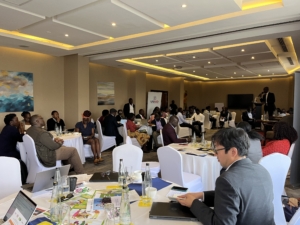 SAID and LBNL co-organized a national workshop with the Ministry of Energy and Mineral Development of Uganda in Kampala on July 27th as part of the Energy Empowers East Africa (EEEA) program. The workshop focused on Productive Use of Electricity (PUE), Energy Efficiency, and Gender Equality, addressing critical energy challenges and opportunities at a country level. More than 85 stakeholders participated, including representatives from ministries, private sector entities, non-governmental organizations, financial institutions, and local communities. Participants actively explored potential pathways to enhance the efficient and productive use of energy in Uganda, with the goal of increasing efficient energy usage to stimulate economic growth and improve livelihoods.
SAID and LBNL co-organized a national workshop with the Ministry of Energy and Mineral Development of Uganda in Kampala on July 27th as part of the Energy Empowers East Africa (EEEA) program. The workshop focused on Productive Use of Electricity (PUE), Energy Efficiency, and Gender Equality, addressing critical energy challenges and opportunities at a country level. More than 85 stakeholders participated, including representatives from ministries, private sector entities, non-governmental organizations, financial institutions, and local communities. Participants actively explored potential pathways to enhance the efficient and productive use of energy in Uganda, with the goal of increasing efficient energy usage to stimulate economic growth and improve livelihoods.
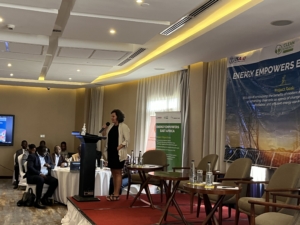 The workshop was held at a pivotal time for Uganda, as it revised the Energy Efficiency and Conservation Bill. The knowledge exchange and collaboration inspired the development of actionable next steps to optimize the benefits of electricity utilization in productive sectors and laid the ground for the development of a national PUE strategy to effectively leverage both on grid and off grid electricity resources in innovative ways.
The workshop was held at a pivotal time for Uganda, as it revised the Energy Efficiency and Conservation Bill. The knowledge exchange and collaboration inspired the development of actionable next steps to optimize the benefits of electricity utilization in productive sectors and laid the ground for the development of a national PUE strategy to effectively leverage both on grid and off grid electricity resources in innovative ways.
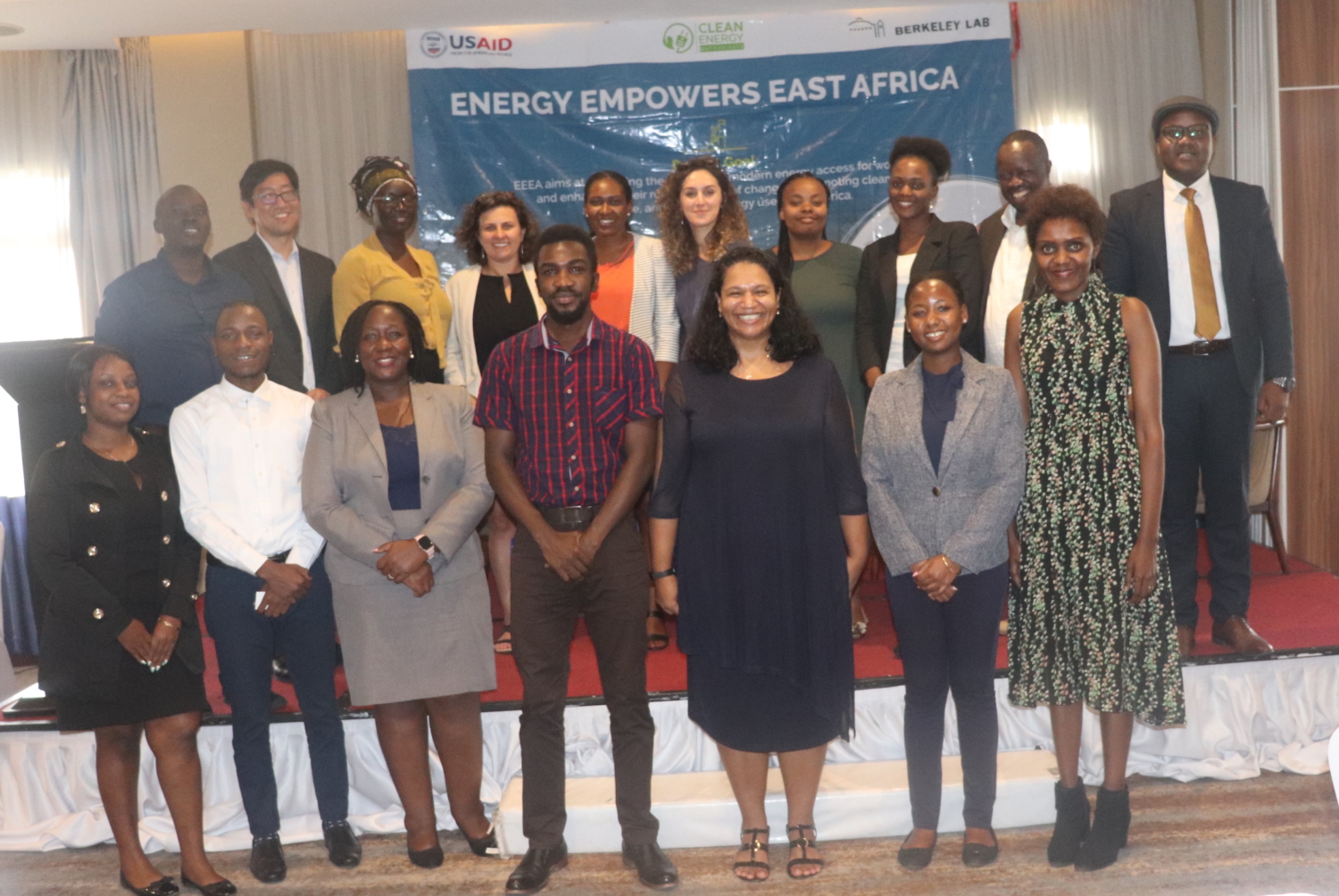
EE4D’s photo documentation of the Energy Empowers East Africa program has been selected as winner in USAID’s 2023 Energy Sector Photo Contest! The winning photo in the Energy Efficiency category showcases how modern, clean and efficient electric equipment supports women in all business settings to increase productivity and generate income. Measuring and monitoring your equipment is essential to manage energy use, costs, footprint and productivity. In all energy access programs, we need to remember that electrification needs women, and women need electrification.
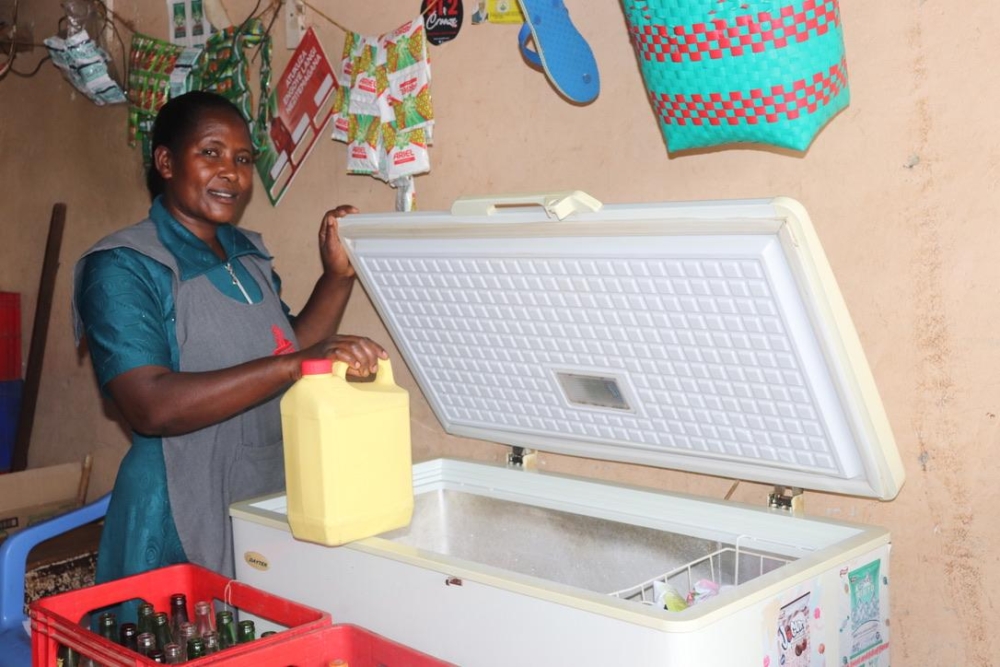
International development project enables Ugandan women to grow small businesses with energy-efficient electrical equipment – and fight climate change at the same time. Women who run small businesses in Uganda can build energy efficiency into their business plans thanks to a new project led by Lawrence Berkeley National Laboratory (Berkeley Lab) and the U.S. Agency for International Development (USAID), in partnership with Clean Energy Enthusiasts (CEE), an energy advisory company based in Uganda.
Shamim Jaffar, a business owner in rural Uganda, had never learned how appliances like her refrigerator use electricity. “I had no idea what the temperature dial switch does,” she explained.
Shamim Jaffar, a business owner in rural Uganda, had never learned how appliances like her refrigerator use electricity. “I had no idea what the temperature dial switch does,” she explained. “I didn’t expect that opening the fridge [for long periods] could have such an impact on its electricity consumption,” agreed Irene Tumusiime. “As a retail shop owner, I am constantly opening my fridge to serve cold drinks to customers.”
Read the article U.S. Agency for International Development on Medium here.
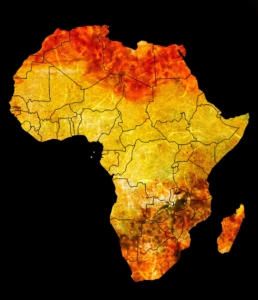 USAID’S Scaling Up Renewable Energy (SURE) program convened a webinar on October 27th, 2022 with participation by TetraTech, CLASP and LBNL to identify potential energy efficiency interventions in Sub-Saharan Africa (SSA), region that is experiencing a rapid population growth and increased energy demand in the sectors of transportation, cooling, buildings and agriculture.
USAID’S Scaling Up Renewable Energy (SURE) program convened a webinar on October 27th, 2022 with participation by TetraTech, CLASP and LBNL to identify potential energy efficiency interventions in Sub-Saharan Africa (SSA), region that is experiencing a rapid population growth and increased energy demand in the sectors of transportation, cooling, buildings and agriculture.
During its participation, LBNL highlighted the building blocks of energy efficiency (standards and retrofits, market priming and financing and policy planning) and provided an example of a successful technical assistance project in South Africa, where significant energy savings were achieved by supporting a standards and labeling program targeting key appliances.
The webinar was attended by more than a hundred representatives from consulting and development organizations in SSA and provided useful inputs to SURE for the development and implementation of impactful energy efficiency interventions in the region.
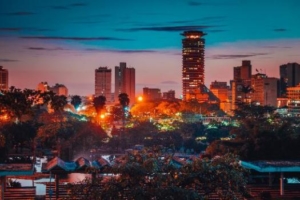 As part of technical assistance provided by USAID’s Kenya Energy Regulatory Partnership Program to develop capacity building on energy efficiency and energy management, LBNL participated in a webinar convened by the National Association of Regulatory Utility Commissioners (NARUC) on October 18th for the local USAID mission and for Kenya’s Energy and Petroleum Regulatory Authority (EPRA) to deliver the presentation “Standards and Labeling Implementation”. LBNL shared an overview of the process to developing regulations and standards for household appliances, international best practices in standards and labeling, information on household energy consumption dynamics, compliance/enforcement, and case studies from relevant jurisdictions. USAID is supporting EPRA as it evaluates its existing and new MEPS for appliances. The technical inputs by LBNL will contribute to improving capacity of the government to implement a successful MEPS program to improve grid reliability and ensure peak demand increases do not outpace generation.
As part of technical assistance provided by USAID’s Kenya Energy Regulatory Partnership Program to develop capacity building on energy efficiency and energy management, LBNL participated in a webinar convened by the National Association of Regulatory Utility Commissioners (NARUC) on October 18th for the local USAID mission and for Kenya’s Energy and Petroleum Regulatory Authority (EPRA) to deliver the presentation “Standards and Labeling Implementation”. LBNL shared an overview of the process to developing regulations and standards for household appliances, international best practices in standards and labeling, information on household energy consumption dynamics, compliance/enforcement, and case studies from relevant jurisdictions. USAID is supporting EPRA as it evaluates its existing and new MEPS for appliances. The technical inputs by LBNL will contribute to improving capacity of the government to implement a successful MEPS program to improve grid reliability and ensure peak demand increases do not outpace generation.
Countries in sub-Saharan Africa are working to provide accessible, affordable, and reliable energy while navigating a transition to net-zero emissions. At the same time, these countries are experiencing rapid population growth which has major implications for energy demand for transportation, agriculture, buildings, and cooling.
USAID’s Scaling Up Renewable Energy (SURE) program held a webinar that explores opportunities in energy efficiency interventions in Sub-Saharan Africa and successful approaches for energy efficiency planning and implementation.
Energy efficiency technologies, policies, and financing can reduce electricity costs for businesses and consumers over the long term while creating local jobs and reducing emissions. Energy efficiency also reduces public expenditure on generation capacity and is a cost-effective way to boost competitiveness in industrial and commercial sectors that can spur economic growth.